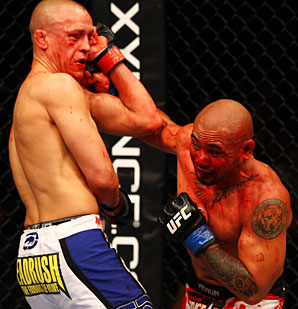
UFC featherweight Yagin plans six-month layoff after head injury
The UFC featherweight, who was amidst training for a bout against German striker Dennis Siver at UFC on Fox 5 on Dec. 8, woke up on Nov. 11 to debilitating migraine-equivalent pain. When his body wouldn't hold down any of the fluids he drank to replenish his body, the 33-year-old Yagin decided to go to the emergency room.
Doctors at the Sharp Grossmont Hospital in La Mesa, Calif., conducted an MRI and a CAT scan, then immediately admitted the fighter when the tests revealed a subdural hematoma. Yagin (16-5-1) was held for observation with the possibility of surgery if his condition didn't approve. After the swelling subsided, Yagin was released three days later.
Yagin said he plans to heed his physician's recommendation for six month's rest before he resumes his fighting career. The UFC replaced Yagin last week with Nam Phan, who will now meet Siver in the Dec. 8 bout.
"The headaches I was feeling were actually the blood touching my brain," said Yagin, a Filipino-American native of Hawaii who moved stateside in 2006. "I've had so many injuries in my life that I wasn't scared. The only thing I was scared about was surgery, of getting drilled into my skull to drain the blood. That was the part that told me that if I had to do that, it would be the end of my fight career for sure."
Retracing his steps has been a priority for Yagin since his hospital release. On Dec. 10, a day prior to his admission, he'd worn the standard-issue headgear, 16-ounce gloves and shin guards during his sparring session.
"There was no devastating blow. I didn't get knocked down. I didn't get knocked out. It was my everyday routine, just getting ready for the fight," he said.
After eating lunch with his teammates, Yagin returned to his San Diego home, where the first indications of the headache began. Yagin took a vicodin, prescribed to him after he'd broken his nose against Mark Hominick during their UFC 145 bout last April, and went to bed. The next morning, Yagin woke to find his headache had intensified and seemed to be getting worse by the minute.
"I read that it could have happened from taking blood thinners and anticoagulant medication like aspirin and ibuprofen," said Yagin, a father to two daughters and a son, ages 2 to 14. "Along with that, I was probably just hit in the right spot at the right time."
Yagin said he hadn't had any prior head-injury issues and is relieved he sought out medical assistance when he did.
"I just knew something was wrong," said Yagin. "The doctors said if I hadn't come to them when I did, it probably would have been a lot worse. This was a regular training day. Nobody knew this was going to happen and it's crazy how big it got."
Yagin's medical bills will be covered by health insurance provided by UFC owners Zuffa LLC, which began offering an out-of-competition benefits plan to its 300-plus contracted fighters last year. Yagin said multiple Zuffa representatives have contacted him to check on his status, including UFC owners Lorenzo Fertitta and Dana White and matchmaker Sean Shelby.
"I couldn't be any more grateful to be a part of a [fight] promotion that takes care of its fighters," said Yagin.
The loss of fight income isn't a welcome development for Yagin heading into the holidays, but he plans to return to his native Hawaii to pick up work as a tattoo artist (a skill he learned at age 14) and as a Filipino-fusion cook, as well as spend time with his family.
"I'm about six months away from anything strenuous, because the last thing I want to do is make it worse," said Yagin. "I want to fully recover. It's happened before, where I've come back to the gym from other injuries, been only 80 or 90 percent better and made things worse."
Yagin, who's been fighting since 2000, hopes his experience will encourage other injured fighters to heed warning signs, even if they happen on the most mundane of training days.
"You know your own body," said Yagin. "If you want to see yourself in the cage more in the future, I'd say to seek medical attention as soon as you feel there's something wrong. Don't let the coaches sway you if they try to; they can't feel the pain you're feeling."




